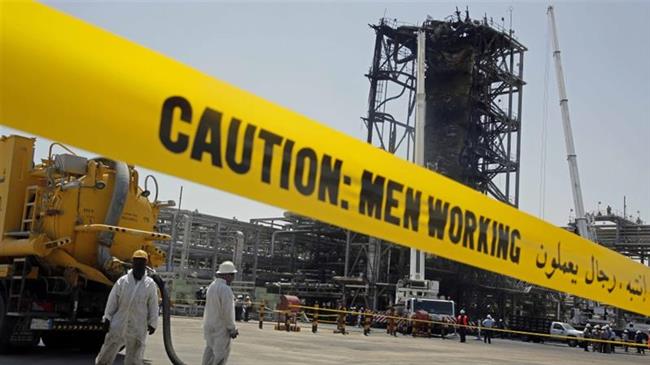Yemeni attack on Aramco facilities costs Saudi $2bn worth of oil output
Saudi Arabia has lost $2 billion worth of its oil production after Yemen's retaliatory attacks on the kingdom's vital energy infrastructure last month, a report by the Financial Times says.
The country's output fell by nearly 1.3mn barrels a day in September, from the previous month, according to data submitted to the Organization of Petroleum Exporting Countries (OPEC) by analysts and consultants, which is used by the cartel to set official production targets.
Saudi Arabia told OPEC’s research arm that production was only hit by 660,000 bpd, according to a monthly oil market report published on Thursday.
Riyadh has sought to emphasize its ability to bring production back to normal levels and the resiliency of the state energy group Saudi Aramco, FT reported Thursday.
The country has tried to maintain its exports using oil in storage. However, energy consultants, analysts and industry executives have questioned the ability of the country’s production and exports to recover to above 9mn bpd within weeks.
It is also unclear how Saudi officials are going to stop such attacks from happening again.
The attack by Yemeni forces last month shut down 5.7 million bpd of Saudi Arabia’s oil production, which represents more than half of the kingdom’s or five percent of global output.
Energy analysts have said the raid was akin to a massive heart attack for the oil market and global economy. It has already plunged OPEC's oil production to the lowest level since 2011.
The attacks would also cause a decline in Saudi Arabia’s economic growth this year, the World Bank has said in a report.
The report published on Thursday revised forecast about Saudi Arabia’s yearly growth of gross domestic product (GDP) from an earlier 1.7% announced in April to 0.8%, saying the decline was mainly due to oil production cuts caused by September 14 attacks as well as a worsening global outlook.
“The attacks on Saudi oil facilities in September led to a significant supply disruption which is also expected to impact 2019 growth,” said the report about the attacks by Yemen’s Houthis targeting oil facilities run by state-run Aramco company in eastern Saudi Arabia.
Saudi Arabia has constantly denied the attacks would have any impact on the kingdom’s finances, with the government estimating that GDP growth would stand at around 1.9% at the end of 2019.
The attacks caused a serious decline in valuation of Aramco, a company that was planned for a listing in the domestic stock market as part of a bid to finance government programs for economic modernization.
Riyadh said last month it was disappointed by an announcement by rating agency Fitch which had downgraded the country’s credit rating to A from A+ following the attacks.
VIDEO | Iran-Syria: For Resistance
Qassam Brigades claims killing 3 Israeli troops in northern Gaza
More alive than ever: Sayyed Hassan Nasrallah's legacy grows stronger in martyrdom
Occupation of Syria’s highest peak Mount Hermon part of ‘Greater Israel’ project
Iran: Syrian people will decide their future without foreign interference
IRGC says Iran’s power exceeds borders, warns enemies to adjust themselves
Dozens detained, several wounded in Israeli raids in West Bank
‘Ethnic cleansing’: Hamas blasts Israeli attacks on Gaza hospital amid intl. silence












 This makes it easy to access the Press TV website
This makes it easy to access the Press TV website